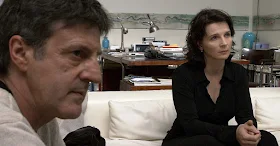Pages
▼
Friday, December 20, 2019
Caché (Michael Haneke, 2005)
Caché (Michael Haneke, 2005)
Cast: Daniel Auteuil, Juliette Binoche, Maurice Bénichou, Annie Girardot, Bernard Le Coq, Walid Afkir, Lester Makedonsky, Daniel Duval, Nathalie Richard. Screenplay: Michael Haneke. Cinematography: Christian Berger. Production design: Emmanuel de Chauvigny, Christoph Kanter. Film editing: Michael Hudecek, Nadine Muse.
Caché is one of those films I want to like more than I really do. It's a thriller without a payoff, somewhat in the mode of Michelangelo Antonioni's L'Avventura (1960) in that it's a mystery that doesn't get solved. But Michael Haneke is a colder, more cynical filmmaker than Antonioni, so that I can never quite shake the feeling that Haneke is just toying with us, parading themes like deception and guilt before us without having anything particularly revealing to say about those topics. On the other hand, we live in an age of increasing invasions of privacy, when the technologies we depend on seem to betraying our secrets to the world, so Haneke's film may have an element of prescience to it. The premise is this: a couple, Georges and Anne Laurent, played with their usual edgy brilliance by Daniel Auteuil and Juliette Binoche, receive a videotape that's simply a record of the façade of their house during several hours of what seems to be random day. It's a premise that David Lynch used some years earlier in Lost Highway (1997), but where Lynch expanded from that into a florid nightmare of a story, Haneke simply traces the slow effect of that enigmatic tape on the Laurents, who are initially unsettled by it but not particularly concerned. And then more tapes arrive, some wrapped in childlike drawings that have a more sinister effect, and the Laurents begin to worry. Is it a threat, a kind of terrorism, or is it just a prank, played perhaps by one of the friends of their teenage son, Pierrot? Eventually, Georges realizes that he is the primary target of this strange harassment, and that the perpetrator is someone who knows about something that happened when Georges was only 6 years old. The confrontation with the man he suspects is responsible for the tapes proves calamitous, made worse by Georges's initial attempt to keep the truth from Anne. Still, at the film's end, there is no real resolution: We may suspect we know the truth, but Haneke never gives us certainty. It's a film that provokes analysis, but I'm not convinced that it entirely deserves it.
Charles Matthews







